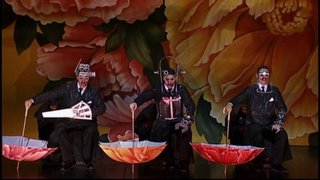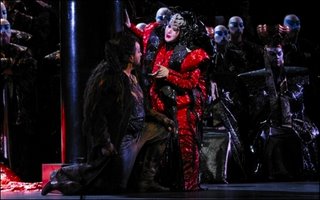So, what's the story about? Who is Turandot?
Turandot is the beautiful cold-hearted femme fatale Princess of anncient China, whoever wants to marry her must answer her three riddles, either he succeed or he beheaded. In Act I, at night, when the moon rises, the unknown Prince, Calaf, was bewitched by her beauty when she first appeared in the balcony to give death order to the Persian Prince. Calaf stikes three times the gong posing himself as the suitor of Turandot.
must answer her three riddles, either he succeed or he beheaded. In Act I, at night, when the moon rises, the unknown Prince, Calaf, was bewitched by her beauty when she first appeared in the balcony to give death order to the Persian Prince. Calaf stikes three times the gong posing himself as the suitor of Turandot.
Act II, Turandot explains in her famous aria In Questa Reggia that her ancestor, Princess Lo-u-Ling, was ravished and murdered by a foreigner, and now out of revenge she has sworn to never let any man possess her. She warns the Prince to withdraw, but he refuses. The Princess presents her riddles:
Turandot is the beautiful cold-hearted femme fatale Princess of anncient China, whoever wants to marry her
 must answer her three riddles, either he succeed or he beheaded. In Act I, at night, when the moon rises, the unknown Prince, Calaf, was bewitched by her beauty when she first appeared in the balcony to give death order to the Persian Prince. Calaf stikes three times the gong posing himself as the suitor of Turandot.
must answer her three riddles, either he succeed or he beheaded. In Act I, at night, when the moon rises, the unknown Prince, Calaf, was bewitched by her beauty when she first appeared in the balcony to give death order to the Persian Prince. Calaf stikes three times the gong posing himself as the suitor of Turandot.Act II, Turandot explains in her famous aria In Questa Reggia that her ancestor, Princess Lo-u-Ling, was ravished and murdered by a foreigner, and now out of revenge she has sworn to never let any man possess her. She warns the Prince to withdraw, but he refuses. The Princess presents her riddles:
"What is born each night and dies each dawn?"
"Hope."
"What flickers red and warm like a flame, but is not fire?"
"Blood."
"What is like ice, but burns?"
"Turandot!"

The Prince suceeds and it's Turandot's duty to marry him. Turandot get angry and pleads her father / Emperor not to leave her at the unknown Prince's mercy. The Prince offers her his riddle, "Bring me my name before sunrise, and at sunrise, I will die."
Act III opens with Calaf's Nessun Dorma with the distant repetition of Turandot's order to search for his name. Calaf's maid, Liu, is tortured by the soldiers for the Prince's name. Liu, who loves the Prince, sings, "The name that you seek I alone know." Turandot demands it, Liu answers, "Love", and suicides. Terrified by Liu's suicide and Turandot's cold-heartness, the crowd withdraws leaving Calaf and Turandot alone on stage. Calaf tries to convince Turandot to love him but in vain. He holds her and kisses her, and she feels herself turning towards passion.
Finale: Dawn is breaking, Turandot approaches the Emperor's throne and declares, "His name is .... Love!" (Curtain falls)
The beauty of the Opera is in the enigmatic and poetic of the 3 deadly riddles and the final resolving riddle. Wasn't Puccini irrational in the Prince's dumb move of posing the last riddle to Turandot and giving her a chance to escap and chop off his head?
Well, Calaf doesn't say "Guess my
 name or you will die" but "Bring me my name and I will die". He actually wants to lose the game since whatever Turandot guesses, it would just be his name. He wants to marry her, of course, but he wants to defeat her cold-hearted defensiveness and have her fall in love with him. He will then die, in the sense of loosing himself completely to her and her love.
name or you will die" but "Bring me my name and I will die". He actually wants to lose the game since whatever Turandot guesses, it would just be his name. He wants to marry her, of course, but he wants to defeat her cold-hearted defensiveness and have her fall in love with him. He will then die, in the sense of loosing himself completely to her and her love.In Nessun Dorma, Turandot hasn't yet figured out all this love poetry business, and still thinks that she just has to get someone to reveal the Prince's name and then she can chop off his head. So she puts out a decree that no one in Pekin is allowed to sleep until the name is revealed.
When Puccini wrote the opera in 1902, it was a period of vexed relationships between China and the Western powers. In Europe, people were fascinated with Chinese art and culture at the same time, afraid of its "barbarism". Puccini's creation of a cruel Turandot while employing the beautiful Chinese folk songs as the musical themes for the opera is a classical love-hatred Western reaction towards China at turn of last century.
According to a interesting musicology study by Johathan Petty and Marshall Tuttle (2001), the Key signature is highly symbolic in the Opera. Throughout Act I, Puccini emphasizes Calaf's D Major (D) as leading tone to Turandot's E Flat Minor (Eb). This is a symbol of a definitive phallic threat from D which she seeks to deny. This threat is made explicit when Calaf rings the gong in D major, releasing energy that abducts Turandot's motif, and incites the Prince to modulate upward into Eb, signifying his surrender to Turandot's imperious beauty, as well the Moonrise and the position of Turandot in the highrise balcony.
In Act II, the solutions to Turandot's 3 riddles occur to the key scheme of D-D-Eb, precisely consistent with the psychological drama of the opera. "Hope" and "Blood" riddles are sung in D, Calaf's signature, "Turandot" riddle is self-evident in the Eb signature.
Then Turandot takes the patriachal C Major to plead to her father, when he insists that she should obey her own law, she crawls from C major up one octave to her father's C.
In Act III, Nessun Dorma starts with the chorus in Turandot's Eb, accending to Calaf's D. The power axis is reversed and thrusts Turandot's Eb and Bb down when the principle melodic material of the aria arrives in D, having released itself from the power of the Eb. And the final climax achieved on the word 'vinceró' is on A, the key which conquered Lo-u-Ling's Fb minor.
Courtesy: FamiliaOrero (Argentine)
This is another version by one of The Three Tenors, Placido Domingo, with The Metropolitan Opera in 1988, here the chorus lines are back and the stage design is wonderful.
This analysis of Petty (2001) gives another aspect of how music articulate psychological changes in the characters. Such as in Nessun Dorma, it's so touch simply because there are some many contradictory moods and emotions going on at the same, they are beyond the description of words but music!
Photo credits:
2002 coproduction of the Mariinski Theatre, St. Petersburg and the Festpielhaus Baden-Baden.
2 comments:
Thank you for bring these back to me and now I can have a nice sleep! ^_^
Liliane,
I love sharing with friends beautiful things.
Were you once working on the Turandot project in Arts Fest 2002 when it was cancelled later?
Dear, hope and love be with you!
Post a Comment